Unit One-words and expressions
- 格式:doc
- 大小:97.00 KB
- 文档页数:8

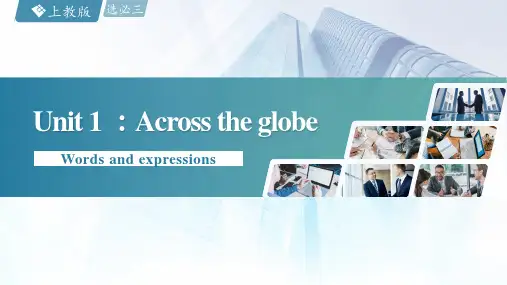
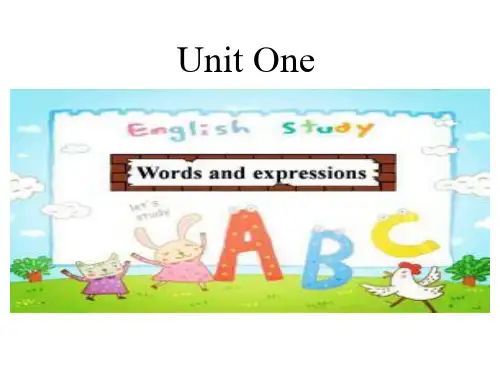
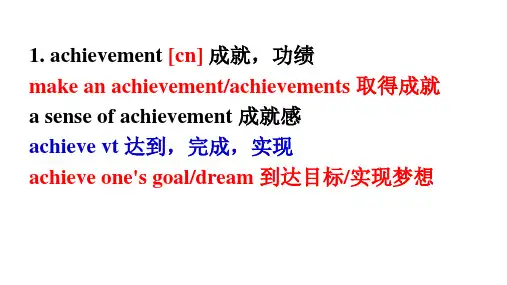
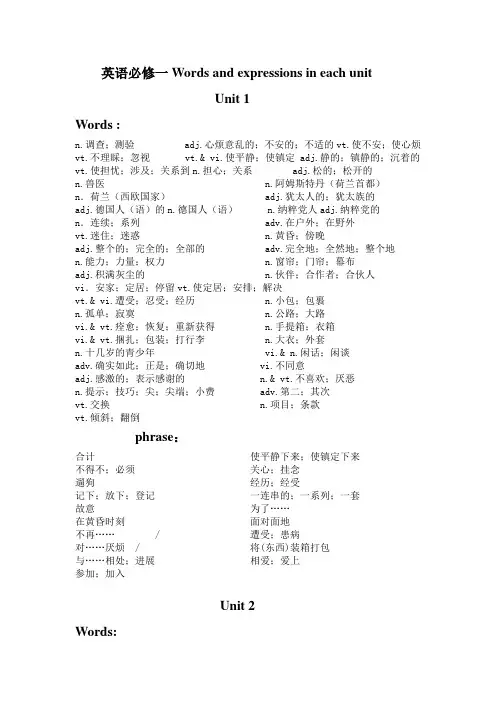
英语必修一Words and expressions in each unitUnit 1Words :n.调查;测验 adj.心烦意乱的;不安的;不适的vt.使不安;使心烦vt.不理睬;忽视 vt.& vi.使平静;使镇定 adj.静的;镇静的;沉着的vt.使担忧;涉及;关系到n.担心;关系 adj.松的;松开的n.兽医 n.阿姆斯特丹(荷兰首都)n.荷兰(西欧国家) adj.犹太人的;犹太族的adj.德国人(语)的n.德国人(语) n.纳粹党人adj.纳粹党的n.连续;系列 adv.在户外;在野外vt.迷住;迷惑 n.黄昏;傍晚adj.整个的;完全的;全部的 adv.完全地;全然地;整个地n.能力;力量;权力 n.窗帘;门帘;幕布adj.积满灰尘的 n.伙伴;合作者;合伙人vi.安家;定居;停留vt.使定居;安排;解决vt.& vi.遭受;忍受;经历 n.小包;包裹n.孤单;寂寞 n.公路;大路vi.& vt.痊愈;恢复;重新获得 n.手提箱;衣箱vi.& vt.捆扎;包装;打行李 n.大衣;外套n.十几岁的青少年 vi.& n.闲话;闲谈adv.确实如此;正是;确切地 vi.不同意adj.感激的;表示感谢的 n.& vt.不喜欢;厌恶n.提示;技巧;尖;尖端;小费 adv.第二;其次vt.交换 n.项目;条款vt.倾斜;翻倒phrase:合计使平静下来;使镇定下来不得不;必须关心;挂念遛狗经历;经受记下;放下;登记一连串的;一系列;一套故意为了……在黄昏时刻面对面地不再…… / 遭受;患病对……厌烦 / 将(东西)装箱打包与……相处;进展相爱;爱上参加;加入Unit 2Words:n.地下人行道;(美)地铁 n.电梯;升降机n.(英)汽油 =(美) n.汽油;气体;煤气;毒气adj.官方的;正式的;公务的 n.航行;航海vt.征服;占领 adj.本国的;本地的 n.本地人;本国人n.(美)公寓住宅;单元住宅 adv.实际上;事实上公元 vt.以……为根据n.基部;基地;基础adj.逐渐的;逐步的 adv.逐渐地;逐步地n.丹麦语adj.丹麦人(语)的 vt.使富裕;充实;改善n.词汇;词汇量;词表 n.拼写;拼法adj.较后的;后半的;(两者中)后者的 n.本身;本体;身份adj.流利的;流畅的 adv.流利地;流畅地n.新加坡(东南亚国家) n.马来西亚(东南亚国家);马来群岛adj.频繁的;常见的 adv.常常;频繁地n.使用;用法;词语惯用法 n.& vt.命令;指令;掌握n.& vt.请求;要求 n.方言n.词语;表示;表达adj.中西部的;有中西部特征的adj.非洲的;非洲人的;非洲语言的 n.鲶鱼adj.西班牙的;西班牙人的;西班牙语的n.西班牙人(语)adj.东方的;东部的 adj.东南方的;来自东南的adj.西北方的;来自西北的 vt.辨认出;承认;公认n.(英)卡车 =(美) n.口音;腔调;重音n.闪电 adv.直接;挺直adj.值得;笔直的;正直的n.街区;块;木块;石块 n.出租车phrase:因为;由于走近;上来;提出现在;目前利用;使用例如……;像这种的扮演一个角色;参与Unit 3Words:n.日记;杂志;定期刊物 n.运送;运输vt.运输;运送vt.更喜欢 n.不利条件;不便之处n.费用 n.路线;路途n.湄公河 vi.流动;流出n.流动;流量vt.说服;劝说 vi.骑自行车vi.毕业n.大学毕业生 adv.最后;终于n.时间表;进度表vt.为某事安排时间 adj.喜爱的;慈爱的;宠爱的n.缺点 adj.顽固的;固执的vt.组织;成立 n.细节;详情n.来源;水源 vt.决定;确定;下定决心adj.坚决的;有决心的 n.旅行;旅程n.海拔高度;高处 n.地图;地图集n.冰河;冰川 n.急流n.山谷;流域 n.瀑布vi.缓慢而行;踱步n.一步;速度;步调 n.三角洲n.弯;拐角vt.使弯曲vi.弯身;弯腰 n.态度;看法n.(指河流等)蜿蜒缓慢流动 n.珠穆朗玛峰vi.(指液体)沸腾;(水)开 n.小包;包裹n.& vt.预测;预报 n.保险n.羊毛;毛织品 adj.可信赖的;可靠的n.风景;视野;观点;见解 n.牦牛n.枕头;枕垫 n.午夜;子夜n.火焰;光芒;热情 prep.在……下面n.老挝(东南亚国家) n.老挝人adj.老挝人的n.庙宇;寺庙 n.洞穴;地窖vt.观看;注视;考虑phrase:自从;自……以后喜爱;喜欢关心;忧虑;惦念改变主意下决心;决定投降;屈服;让步照常在午夜Unit 4Words:n.地震 n.地震n.井 n.裂缝;噼啪声adj.发臭的;有臭味的 n.农场;农家n.管;导管 vi.爆裂;爆发n.突然破裂;爆发n.百万 n.事件;大事n.民族;国家;国民 n.运河;水道n.蒸汽;水汽 n.污垢;泥土vt.断定;判断;判决 n.报刊的大字标题n.废墟;毁灭vt.毁灭;使破产 n.苦难;痛苦adj.极度的 vt.损害;伤害n.幸存者;生还者;残存物 vt.破坏;毁坏;消灭n.砖;砖块 n.水坝;堰堤n.轨道;足迹;痕迹 adj.无用的;无效的;无意的n.快车;速递 n.骑自行车的人vt.& vi.使震惊;震动 n.& vt.援救;营救vt & vi.使开裂;破裂 n.电;电流;电学vt.使陷入困境n.陷阱;困境 n.矿;矿山;矿井n.灾难;灾祸 vt.埋葬;掩埋;隐藏n.矿工 n.休克;打击;震惊n.掩蔽;掩蔽处;避身处 n.标题;头衔;资格n.记者 n.条;棒;条状物n.& vt.损失;损害 vt.使惊吓;吓唬adj.受惊的;受恐吓的 adj.令人恐惧的n.祝贺;(复数)贺词 n.裁判员;法官adv.真诚地;真挚地 vt.表示;表达n.要点;大纲;轮廓phrase:立刻;马上仿佛;好像结束;终结严重受损;破败不堪掘出;发现许多;大量的Unit 5Words:n.质量;品质;性质 adj.热心肠的adj.吝啬的;自私的;卑鄙的 adj.积极的;活跃的adj.慷慨的;大方的 adj.随和的;温和宽容的n.自我;自身 adj.自私的adj.无私的;忘我的 adv.无私地;忘我地vt.(与连用)献身;专心于 adj.忠实的;深爱的n.【圣经】 n.侵略者vt.建设;建立 n.共和国;共和政体n.法则;原则;原理 n.民族主义;国家主义n.生计;谋生 adj.和平的;平静的;安宁的adj.巨大的;庞大的 n.飞跃;跳跃n.人类 n.律师n.指导;领导 adj.法律的;依照法律的n.费(会费;学费等);酬金 n.青年;青年时期n.南非共和国有色人种的身份证 n.同盟;联盟;联合会n.舞台;阶级;时期 n.意见;看法;主张vt.& vi.投票;选举n.投票;选票;表决 vt.进攻;攻击;抨击n.暴力;暴行 adj.相等的;平等的adj.乐意的;自愿的 adj.不公正的;不公平的n.引用语;语录 vt.释放;发行vi.& vt.逃脱;逃走;避开 n.毛毯;毯子vt.教育;训练 adj.受过教育的;有教养的vi.请求;乞求 n.亲戚;亲属n.恐怖;可怕的人;恐怖时期;恐怖活动 n.残忍;残酷n.报酬;奖金vt.酬劳;奖赏 vt.判决;宣判[前缀]反;抗;阻 adj.反黑人的n.系统;会长;校长;行长 adj.怀有希望的;有希望的Phrase:失业青年团事实上使充气;爆炸在危险、受罚、痛苦、忧虑等的处境中求助于;致力于丧失勇气或信心当权;上台设立;建立被判处……(徒刑)诺贝尔和平奖。
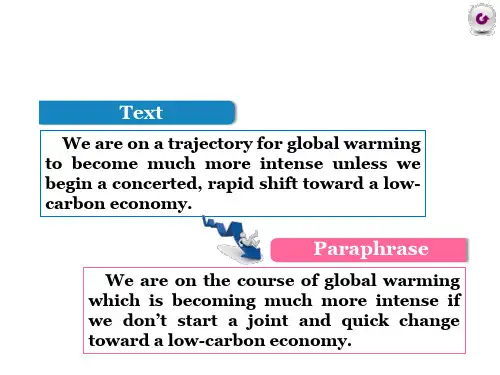
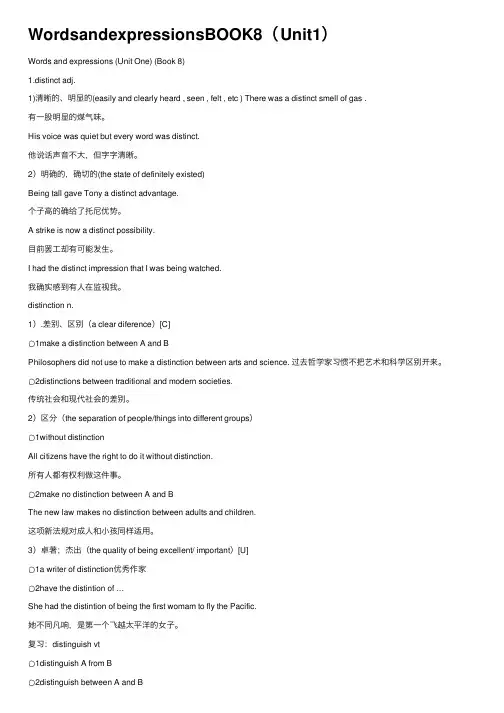
WordsandexpressionsBOOK8(Unit1)Words and expressions (Unit One) (Book 8)1.distinct adj.1)清晰的、明显的(easily and clearly heard , seen , felt , etc ) There was a distinct smell of gas .有⼀股明显的煤⽓味。
His voice was quiet but every word was distinct.他说话声⾳不⼤,但字字清晰。
2)明确的,确切的(the state of definitely existed)Being tall gave Tony a distinct advantage.个⼦⾼的确给了托尼优势。
A strike is now a distinct possibility.⽬前罢⼯却有可能发⽣。
I had the distinct impression that I was being watched.我确实感到有⼈在监视我。
distinction n.1).差别、区别(a clear diference)[C]○1make a distinction between A and BPhilosophers did not use to make a distinction between arts and science. 过去哲学家习惯不把艺术和科学区别开来。
○2distinctions between traditional and modern societies.传统社会和现代社会的差别。
2)区分(the separation of people/things into different groups)○1without distinctionAll citizens have the right to do it without distinction.所有⼈都有权利做这件事。
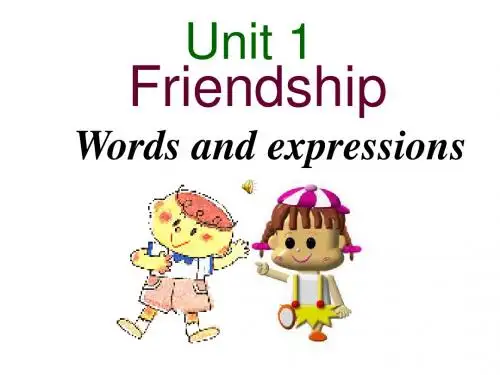
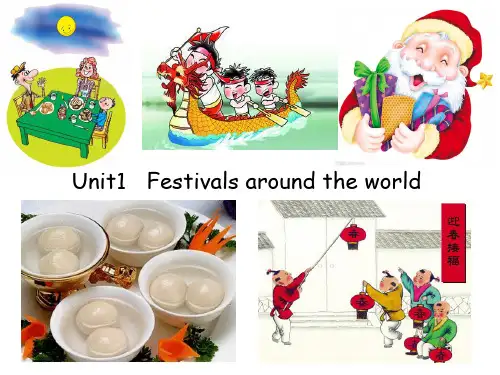
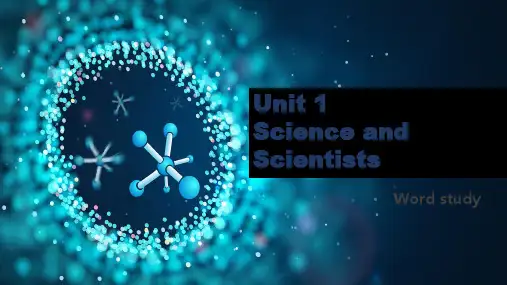
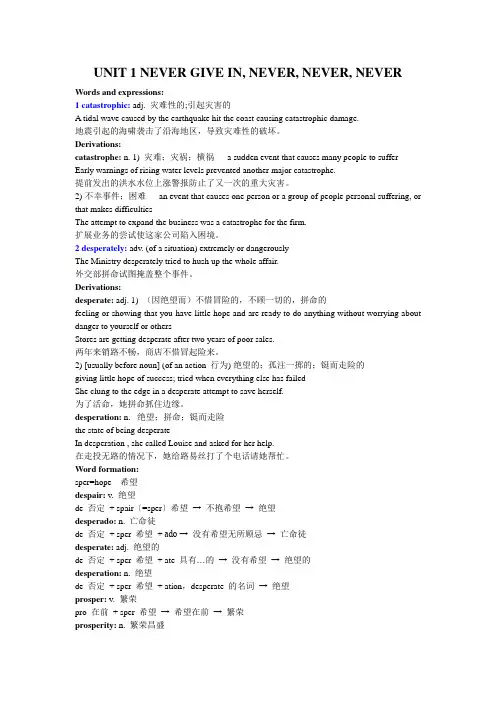
UNIT 1 NEVER GIVE IN, NEVER, NEVER, NEVERWords and expressions:1 catastrophic: adj. 灾难性的;引起灾害的A tidal wave caused by the earthquake hit the coast causing catastrophic damage.地震引起的海啸袭击了沿海地区,导致灾难性的破坏。
Derivations:catastrophe: n. 1) 灾难;灾祸;横祸 a sudden event that causes many people to suffer Early warnings of rising water levels prevented another major catastrophe.提前发出的洪水水位上涨警报防止了又一次的重大灾害。
2)不幸事件;困难an event that causes one person or a group of people personal suffering, or that makes difficultiesThe attempt to expand the business was a catastrophe for the firm.扩展业务的尝试使这家公司陷入困境。
2 desperately: adv. (of a situation) extremely or dangerouslyThe Ministry desperately tried to hush up the whole affair.外交部拼命试图掩盖整个事件。
Derivations:desperate: adj. 1) (因绝望而)不惜冒险的,不顾一切的,拼命的feeling or showing that you have little hope and are ready to do anything without worrying about danger to yourself or othersStores are getting desperate after two years of poor sales.两年来销路不畅,商店不惜冒起险来。
Words and Expressions for Unit 1 Lesson Alook up to sb phrasal verb = to admire and respect someone: 尊敬e.g. He'd always looked up to his uncle.be critical ofprosperity n. [U]= the state of being successful and having a lot of money: 繁荣, 旺盛;成功, 顺利, 幸福e.g. A country's future prosperity depends, to an extent, upon the quality of education of its people.The war was followed by a long period of peace and prosperity.prosperous adj. = successful, usually by earning a lot of money: 繁荣的e.g. In a prosperous country like this, no one should go hungry.adversity noun [C or U]= a difficult or unlucky situation or event: 不幸, 灾祸, 逆境e.g. She was always cheerful in adversity.The road to happiness is paved with adversities.adverse adjective [before noun]= having a negative or harmful effect on sth: 不利的, 敌对的, 相反的e.g. The match has been cancelled due to adverse weather conditions.They received a lot of adverse publicity/criticism about the changes.So far the drug is thought not to have any adverse effects.cheer (sb) up phrasal verb [M]= If someone cheers up, or something cheers them up, they start to feel happier: e.g. She was ill so I sent her some flowers to cheer her up.He cheered up at the prospect of a meal.[R] She went shopping to cheer herself up.drift apart phrasal verb= If two people drift apart, they gradually become less friendly and their relationship ends 疏远essential adjective = necessary; needed: 本质的, 实质的, 基本的e.g. Government support will be essential if the project is to succeed.There is essential work to be done before the building can be re-occupied.Water is essential for/to living things.It is essential (that) our prices remain competitive.For the experiment to be valid, it is essential to record the data accurately.essential noun [C usually plural]= a basic thing that you cannot live without: 本质, 实质, 要素, 要点e.g. Because I live in a remote village, I regard my car as an essential.When we go on holiday, we only take the bare essentials.This leaflet will give you the essentials of how to use the word processor.as far as sb is concerned= in a particular person's opinion:e.g. As far as I'm concerned, feng shui is a load of rubbish.best-selling adjective [before noun] 最畅销的, 最红的e.g. She's a best-selling author (= an author whose books are very popular).demonstrate (SHOW) verb [T] 示范, 证明, 论证, 表示, 表明1. to show; to make clear:e.g. These figures clearly demonstrate the size of the economic problem facing the country.[+ that] Research has demonstrated that babies can recognize their mother's voice very soon after birth.These problems demonstrate the importance of strategic planning.2. to show something and explain how it works:e.g. He's got a job demonstrating kitchen equipment in a department store.[+ question word] The teacher demonstrated how to use the equipment.in detail= including or considering all the information about something or every part of sth: 详细地e.g. We haven't discussed the matter in detail yet.The book described her sufferings in graphic detail.He talked in great detail about the curtains he's chosen for his lounge.straightforward adjective= easy to understand or simple: 简单的, 易懂的, 直接了当的e.g. Just follow the signs to Bradford - it's very straightforward.straightforward adjective= (of a person) honest and not tending to hide their opinions: 正直的, 坦率的e.g. Roz is straightforward and let's you know what she's thinking.run into sb phrasal verb = to meet someone you know when you are not expecting to: 撞上, 偶遇,e.g. Graham ran into someone he used to know at school the other day.stand by sb phrasal verb= to continue to support or help someone who is in a difficult situation: 支持e.g. She has vowed to stand by her husband during his trial.stick up for sth/sb phrasal verb INFORMAL= to support or defend someone or something, especially when they are being criticized: 为...辩护, 维护e.g. I can stick up for myself.It's sweet the way he sticks up for his little brother.put up with sth/sb phrasal verb= to accept or continue to accept an unpleasant situation or experience, or someone who behaves unpleasantly: 忍受, 容忍e.g. I can put up with the house being untidy, but I hate it if it's not clean.He's so moody - I don't know why she puts up with him.They have a lot to put up with (= They have a lot of difficulties).make up phrasal verb = to forgive sb. and be friendly with them again after an argument or disagreement: 和解e.g. They kissed and made up, as usual.We often quarrel but we always make it up soon after.resume verb FORMAL 再继续, 重新开始, 重新占用, 再用, 恢复1. [I or T] If an activity resumes, or if you resume it, it starts again after a pause:e.g. Normal services will be resumed in the spring.[+ ing form of verb] He stopped to take a sip of water and then resumed speak ing.The talks are due to resume today.2. [T] If you resume a place or position which you have left for a period of time, you return to it:e.g. to resume your post/jobPlease resume your seats, as the performance will continue in two minutes.lose touch to stop communicating with someone, usually because they do not live near you now:e.g. We lost touch (with each other) over the years.have sth in common = to share interests, experiences or other characteristics with someone or something:e.g. We don't really have much in common.in common with sb/sth = in the same way as someone or something:e.g. In common with many mothers, she feels torn between her family and her work.social/ educational backgroundsimilar values / personalitiespotential adjective [before noun]= possible when the necessary conditions exist: 潜在的, 可能的e.g. A number of potential buyers have expressed interest in the company.Many potential customers are waiting for a fall in prices before buying.The accident is a grim reminder of the potential dangers involved in North Sea oil production.potential noun [U]= someone's or something's ability to develop, achieve or succeed: 潜能, 潜力e.g. The region has enormous potential for economic development.I don't feel I'm achieving my full potential in my present job.[+ to infinitive] Y ou have the potential to reach the top of your profession.I think this room has got a lot of potential (= could be very good if some changes were made to it). correspond verb [I] = to communicate by writing a letter or sending an email: 通信,e.g. I've been corresponding with several experts in the field.correspond verb [I] = to match or be similar or equal: 相似,相当, 一致:一致e.g. The money I've saved corresponds roughly to the amount I need for my course.The American FBI corresponds to the British MI5.His story of what happened that night didn't correspond with the witness's version.thesis noun [C] plural theses论题, 论文1. a long piece of writing on a particular subject, esp. one that is done for a higher college or university degree:e.g. a doctoral thesis (= for a PhD)2. FORMAL the main idea, opinion or theory of a person, group, piece of writing or speech:e.g. Their main thesis was that war was inevitable.have urge to do sthcount on sb phrasal verb= to be confident that you can depend on someone: 依靠, 指望e.g. Y ou can always count on Michael in a crisis.[+ to infinitive] I can count on my parents to help me.significant adjective = important or noticeable: 重要的, 重大的, 值得注意的e.g. There has been a significant increase in the number of women students in recent years.The talks between the USA and the USSR were very significant for the relationship between the two countries. significance noun [U] = importance:The discovery of the new drug is of great significance for/to people suffering from heart problems.significant adjective= having a special meaning: 有意义的e.g. She looked at him across the table and gave him a significant smile.Do you think it's significant that he hasn't replied to my letter yet?significance noun [U]= special meaning:e.g. Do you think that look he gave you had any significance?sales rep noun [C] (FORMAL sales representative) 商品经销代理, 营业代表= someone who travels to different places trying to persuade people to buy their company's products or services pharmaceutical adjective= connected with the production of medicines: 制药(学)上的e.g. the pharmaceutical industrya pharmaceutical company/product/journalpharmaceutical noun [C usually plural]= a medicineimpulse noun [C + to infinitive]= a sudden strong desire to do something: 刺激; 鼓舞e.g. I had this sudden impulse to shout out "Rubbish!" in the middle of her speech.on (an) impulse= because you suddenly want to, although you haven't planned to:"I didn't know you were looking for some new shoes." "Oh, I wasn't - I just bought them on impulse”impulsive adj. = showing behavior in which you do things suddenly without any planning and without considering the effects they may have: 有推动力的; 冲动的e.g. Don't be so impulsive - think before you act.an impulsive man/decision/gesturemargin noun [C] 页边的空白, (湖、池等的)边缘, 极限, 利润, 差数, (时间、金额等的)富余1. the outer edge of an area:e.g. The plant tends to grow in the lighter margins of woodland areas.2. the empty space to the side of the text on a page, sometimes separated from the rest of the page by a vertical line:e.g. If I have any comments to make, I'll write them in the margin.。
Words & Expressionsget by:be good enough but not very good; manage to live or do things in a satisfactory way- It is a little bit difficult for the old couple to get by on such a small pension.- 我父母靠很少的钱将就着把日子过了下去。
(=My parents managed to get by on a small amount of money.)- She never works but somehow she gets by.haul: vt.1. transport, as with a truck, cart, etc.- The farmers haul vegetables to the market on a truck every morning.- 救援队把药品和食物运到被淹的村庄。
(=The rescue team hauled medical supplies and food to the flooded villages.)2. pull or drag sth. with effort or force- A crane had to be used to haul the car out of the stream.- Rescue workers hauled passengers out of the crashed train.CF: haul, drag & pull这几个词都是动词,都有“拖”、“拉”、“拽”之意。
haul 指缓慢而费力地拖一极重之物,有时可表示很困难地拽。
例如:- Lorries haul heavy goods from factories to ports.(=大卡车把沉重的货物从工厂运到港口。
)drag 指施力者在地面或表面上缓慢而沉重地把东西拖过一段距离,该词通常使人想到主动或被动的阻力。
例如:- You might drag a heavy box across the ground if you couldn’t lift it.(=如果你提不动一个重箱子,你可以在地上拖着它走。
)pull 为最普通用词,可指朝各个方向拉,并不强调用力大小。
该词后面可添加副词或副词词组具体描述拖拉动作的用力大小或方向等。
例如:- They pulled hard but the rock remained stock-still.(=他们使劲地拉,可那石头仍纹丝不动。
)supplement:1. vt. add to sth. in order to improve it (followed by with)- Peter supplements his ordinary income by writing books.- 医生建议在我的饮食中补充维生素E 和A。
(=The doctor suggested supplementing my diet with vitamins E and A.)2. n. an additional amount of sth.- Do you read the color supplements of the Sunday newspapers?(=你读周日报纸的彩色增刊吗?)- She has been ill and must have supplements to her ordinary food.spray: vt. force out liquid in small drops upon (followed by with)- I’ll have to spray the roses with insecticide to get rid of the greenfly (蚜虫).- They sprayed the President’s car with bullets.- 汽车开过,溅了我一身水。
(=A car went past and sprayed me with water.)pursue: vt.1. be busy with; continue (steadily) with- He is pursuing his studies at the university.- After graduation Martin chose to pursue the same career as his father as a doctor.2. follow esp. in order to catch, kill, or defeat- The police are pursuing an escaped prisoner.wicked:adj.evil or bad- We are all born good, but can be taught to be wicked.- 他真邪恶。
(=That was wicked of him.)- I have such a wicked toothache.get through: come successfully to the end- 当地政府已采取一些措施以确保所有人顺利过冬。
(=The local government has taken some measures to ensure that all the people will get through the winter.)- She got through the entrance examination and was accepted by the college.at that point: at that very moment; right then- The train was now only a couple of yards from the kids on the track. At that point, Anthony threw himself forward and pulled them clear.- The man suddenly held up a poster. At that point, all TV cameras were pointed at him.on balance:with all things considered- On balance, it’s probably not advisable to change the company’s name.- 我想,总的来说我更喜欢新的操作系统。
(=I think, on balance, I prefer the new operating system.)NB: balance 的反义词是imbalance。
此外,与balance 有关的其他搭配有:keep one’s balance保持平衡lose one’s balance失去平衡strike a balance 力求折中in the balance 不确定,成败或安危未定illustrate: vt.provide with visual features; clarify by use of examples, etc.- Let me use another example to illustrate this difficult point.CF: illustrate, exemplify & demonstrate这三个词都是动词,都有“举例说明”之意。
illustrate 表示不仅使用具体事例而且有时使用图画,目的是使说明生动、逼真或有效,从而真实地说明某一观点。
例如:- The way that a pump works is used to illustrate how the heart sends blood around the body.(=水泵的工作原理可用来解释心脏是如何将血液送至全身各处的。
)exemplify 可用于举例说明某一笼统、抽象的陈述,也可用于举出某事物的典型或范例。
例如:- Knights exemplified courage and courtesy.(=武士们是勇敢与礼貌的榜样。
)demonstrate 表示用充足且可靠的证据证实某一学术观点或结论,也可用于说明人或事。
例如:- Galileo demonstrated that objects of different weights fall at the same speed.(=伽俐略证实了重量不同的物体以同样的速度下落。
)digest:1. n. a short account of written materials or data- Reader’s Digest is a popular magazine in the US.- He was so busy that he only read a concise digest of their project.2. v.1) change sth. into a form that the body can use- 玛丽吃肥肉不消化。
(=Mary can’t digest fat.)2) think about sth. carefully and understand it- I heard her speech, but I haven’t digested it yet.- 吸收新思想往往需要很长时间。
(=It often takes long time to digest new ideas.)generate: vt.bring into existence; produce- 煤燃烧时,产生热量。
(=When coal burns, it generates heat.)- The widespread use of Spanish in some American cities has generated a public debate over language use in the country.- The teacher’s remark generated loud laughter.insurance:n.guarantee of compensation for loss, damage, sickness, death, etc. in return for regular payment- Does your insurance cover damage by flooding?- Our firm carries fire insurance.Collocation:accident insurance 意外保险medical insurance 医疗保险private health insurance 私人健康保险disability insurance 伤残保险social insurance 社会保险unemployment insurance 失业保险whole life insurance 终身人寿保险pick up:1) be ready to pay 2) improve 3) gain; get 4) take hold of and lift up5) gather together; collect 6) collect someone or something from a placeMatch the following sentences with appropriate definitions above.Where did you pick up your excellent English? (3)Please pick up all your toys when you’ve finished playing. (5)If he loses the case, Michael will have to pick up the bill for legal costs. (1)I’ll pick you up at your hotel. (6)She picked up a stone and threw it at the window. (4)Mary has been ill, but she’s picking up now. (2)premium:n. a sum of money paid regularly to an insurance company to protect sb. against some risk of loss or damage- The employers make the employees pay for a large portion of their health insurance premium.- He is complaining that car insurance premiums have increased too much this year.(=他抱怨说,今年汽车保险费增加得太多。